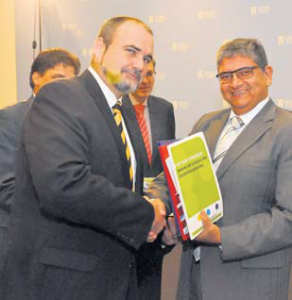The conclusions of the Caribbean Netherlands Evaluation Committee were mostly a confirmation for Saba Commissioner Chris Johnson that the island and its government were right in their statements about the Dutch public entity status.
“Everyone knows that these conclusions were coming. We have been giving off the signals for a long time that a number of things were not working out for us as we had expected. The conclusions fall in line with what we have been saying all along,” said Johnson in a first reaction to the report of the Evaluation Committee that was presented in The Hague on Monday.

One of the more important confirmations for Johnson was the conclusion that a clear agreement was lacking where it pertains the islands’ elevation to a standard of services and provisions that is acceptable within the Netherlands (“voorzieningenniveau”).
The committee concluded that “from the onset, the Netherlands and the islands held different opinions on the interpretation of this agreement, with the result that not all services and provisions (especially social provisions) have been made concrete.” The committee noted that over the years the standard of living continued to decrease and that poverty increased, especially among vulnerable groups such as the elderly and single-parent households.
Johnson said that the fact that this agreement was never carried out basically touched on human rights, and that it was a precondition for a solid economic and social development of the Caribbean Netherlands islands Bonaire, St. Eustatius and Saba. “If we can have an agreement on this, all other things will fall into place,” he told The Daily Herald.
Johnson said that the issue of the standard of services and provisions in the social, human rights area should have been based more on concrete agreements during the negotiations prior to 2010 to achieve new constitutional relations. “At that time, a lot was built on trust during those negotiations.”
The evaluation also confirmed that the ministries in The Hague had insufficient eye for the local circumstances on the islands and that the approach towards the islands was fragmented and sometimes contradictory.
According to Johnson, the islands have been burdened by a huge bureaucracy and complicated regulations which have hampered the public entities in their development, and unnecessarily burdened the local governments. He said the Dutch policy could become a lot more effective and cost efficient if more authority was transferred to the islands.
“A lot of money is made in the process of managing the islands. All these consultants and managers cost a lot. If The Hague would allow the islands to make more of their own decisions and to execute more tasks, it would cost less and be more effective,” said Johnson.
Bonaire Commissioner Clark Abraham said that he was happy with the findings of the Evaluation Committee. “I haven’t fully read the report as yet, but the introduction of the Chairperson Liesbeth Spies showed that the conclusions are in line with our findings.”
Statia Commissioner Reginald Zaandam said that he first wanted to study the report before responding. Asked if he had considered being absent at the presentation of the report because of the tension in the relations with The Hague, he said that the evaluation was too important for St. Eustatius to stay away for this occasion.
Johnson, Zaandam and Abraham will be meeting with the First Chamber of the Dutch Parliament today, Tuesday to discuss the constitutional developments since October 2010 and the findings of the Evaluation Committee.
Meetings with the Council of State and the Second Chamber will take place on Thursday. The three islands are aiming to have a joint formal reaction to the report of the Evaluation Committee by mid-January next year. But before that, Johnson and Zaandam will be in Bonaire for the December 18 constitutional referendum.
The Daily Herald.
 Archive of posts from Saba-News.com Archive Saba News
Archive of posts from Saba-News.com Archive Saba News